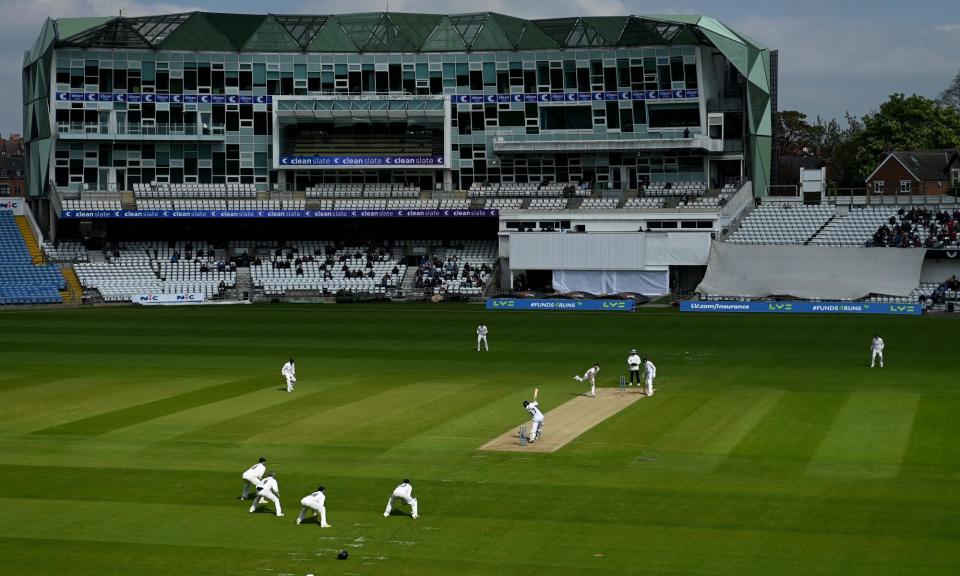
Colin Graves is on the verge of a controversial return as Yorkshire chairman after nine turbulent, dramatic years, but in many ways he never really left. Having kept the club afloat with a succession of cash injections Graves stepped down in March 2015 with a promise that “the bank of Colin Graves has gone”; in reality it did nothing of the sort.
Graves started his career as a teenager on the shop floor at Spar and made his millions after founding Costcutter in 1986. He first joined Yorkshire in 2002 as one of the so-called “Gang of Four” – along with the future chairman Robin Smith, the former spinner Geoff Cope, who played 246 first-class games for Yorkshire and three Tests for England, and Brian Boutell, a former partner in accountancy firm KPMG – who rescued the club from imminent bankruptcy.
Related: Graves’ return to Yorkshire cricket club would be a ‘disaster’, claims MP
“Why did I do it? Purely and simply I couldn’t sit there and watch Yorkshire County Cricket Club go bust,” he said in 2014, after the club won the County Championship for the first time in 13 years, the first of back-to-back titles.
For a while, he seemed to have the magic touch. Graves joined the board of the ECB in 2010, became deputy chairman in 2013 and was elected unopposed to a five-year term as chairman two years later, prompting his departure from Yorkshire. While he was at the ECB, England won the men’s and women’s 50-over World Cups, both in dramatic finals at Lord’s. But he also became an increasingly controversial and divisive figure, pushing through the introduction of the Hundred and suggesting it would be “better for everybody in the game” if some counties gave up on first-class cricket and concentrated on white-ball formats. In 2018, Andy Nash, the former Somerset chairman and an ECB board member for 14 years, resigned claiming that “standards of corporate governance are falling well short of what’s acceptable”.
But it is since Azeem Rafiq spoke out about his experiences of racism at Yorkshire that Graves’s reputation took a toxic turn. Since Rafiq first went public in 2020 the club has admitted that while at Headingley he was victim of racial harassment as well as bullying. Last February, they also admitted liability to four charges brought by the ECB, including “a failure to address systemic use of racist and/or discriminatory language over a prolonged period”, including much of the time when Graves was involved, and his entire period as chair.
But Graves has never made any such concession. Asked last June whether he ever witnessed any racism at Yorkshire, he said: “None whatsoever, from anybody at any level. Nothing.” He said there may have been “odd occasions” when problematic language was used in the dressing room, but said: “I don’t think it was done on a racist, savage basis. I think there was a lot of, and I know people don’t like the word banter, but I think there could have been a lot of banter in there about it.”
Related: New York confirmed as T20 World Cup venue for rivals India and Pakistan
Over time, two different approaches emerged to the club’s handling of allegations of racism. One, led by the former chairman Lord Kamlesh Patel, suggested they should make qualified admissions of guilt and do whatever was necessary to rebuild their reputation. The other, led by Graves and Smith, insisted that the club has nothing to admit to and that attention should be diverted to questions over the processes being used against them or over Rafiq’s own character. Smith, for example, described one DCMS hearing at which Rafiq spoke as “a disgrace, a charade and a blatant show trial”, and the ECB’s handling of charges to their Cricket Discipline Commission as “a dereliction of duty”.
Meanwhile, exacerbated by the pandemic and the exodus of sponsors that followed Rafiq’s initial testimony to the DCMS, Yorkshire were thrown back into the kind of financial turmoil from which Graves had rescued them two decades earlier. He had continued to loan the club money during his time as chairman but more recently the need to find £500,000 each year to finance that debt, which according to their latest accounts stood at £14.9m, pushed them back towards financial peril. Under the terms of their loan, should the club go into administration the Graves Family Trust would almost certainly end up taking control of their key assets, including their Headingley home.
Quite how much Graves leveraged his financial interest into continued influence over the day-to-day running of the club is a subject of debate. When he joined the ECB his loans were consolidated under a family trust to avoid a conflict of interest and Smith, who spent two years as chairman from 2018, said the trust “never interfered once” and that Graves “was never involved”. But Roger Hutton, the chairman from April 2020 until November 2021, said Graves “retained a substantial influence at the club during my entire period as chair”. Graves responded that “all I ever did was offer advice and help”.
Julian Knight MP, chair of the DCMS committee, said evidence pointed towards Graves having exerted “substantial and ongoing interference”, but the 75-year-old has repeatedly refused their invitations to give evidence.
Talk of investment from Saudi Arabian or Indian consortiums or a sale to the former Newcastle owner Mike Ashley has risen over the past 18 months but has come to nothing. Now Graves’s return – and the formality of ratification at a members’ EGM – seems only days away. He is said to be ready to loan the club another £4m. Far from being severed nearly a decade ago, the ties that bind Yorkshire to him continue to tighten.
Article courtesy of
Source link